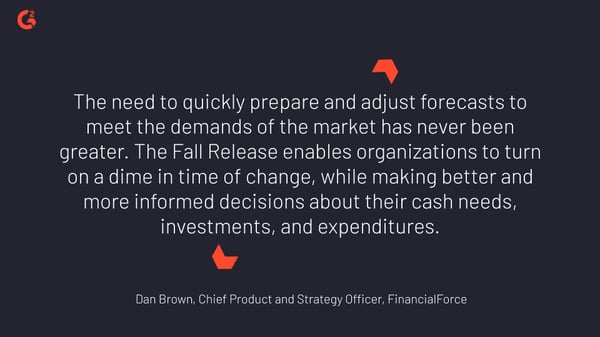On October 20, 2020, it was announced that FinancialForce, a provider of ERP and professional services automation (PSA) software, was releasing several updates and new capabilities to its platforms.
As part of their fall 2020 release, the updates included improved user experiences through integrations, dashboards, and other innovations, as well as advanced business insights. It’s FinancialForce’s opinion that companies can use these new capabilities to succeed and grow.
Leveraging Salesforce, LEX, and new dashboards
With the fall release, FinancialForce also began leveraging Salesforce Analytics and Lightning Experience (LEX) to allow organizations to better adapt, forecast, and plan for constantly shifting business needs. Dan Brown, chief product and strategy officer at FinancialForce said, “Our Fall 2020 Release is designed to deliver greater business insights and forecasting capabilities, as well a modern user experience.” The new LEX is being leveraged to increase productivity, drive user adoption, speed up onboarding, and streamline business processes.
The introduction of new dashboards for services forecasting and cash flow forecasting were designed to arm teams with reporting and planning capabilities, as well as give procurement teams more power to manage suppliers, costs, and inventory. Brown continues, “The need to quickly prepare and adjust forecasts to meet the demands of the market has never been greater. The Fall Release enables organizations to turn on a dime in time of change, while making better and more informed decisions about their cash needs, investments, and expenditures.”
This is proving to be truer than ever in the current climate, with companies adjusting to the financial effects of the coronavirus pandemic. For example, supply chains with reduced or idle production capacity may be unable to allocate overhead costs to inventory as they usually do, or receivable teams may have to account for customers unable to pay outstanding invoices, resulting in credit and bad debt risks. Having the ability to be agile and adjust forecasts, plan, and report, allows organizations to better protect and maintain their cash flow.

Three new workspaces were also added in FinancialForce’s release; since first implementing workspaces in 2019, there are now a total of 13 different workspaces that are designed to streamline how users perform tasks while making decisions better and faster.
New key features
| The key features from the Fall 2020 release are outlined below: |
ERP
- Cash flow forecasting dashboard: forecasts of how cash is predicted to move in and out over a given period of time
- Procurement and inventory dashboards: allows managers to identify underperforming suppliers and improve cost control
- Agile billing: supports the ability to change billing terms
|
PSA
- Services revenue forecasting dashboard: allows services employees to shift from static forecast reporting to operational action
- “In context” time entry: collects and records time entries where the PSA users perform their work
- Task integration with Jira: extends the current Jira integration to the task level
|
Platform
- Embedded analytics: enables teams to embed predictive and prescriptive analytics dashboards directly into workspaces and applications
- Modern UX: expands the current LEX to increase productivity and drive user adoption
- New workspaces: introduces new workspaces namely Services Revenue Forecasting, Time and Expense, and Revenue Management
|
ERP and accounting software are often not very user friendly so it's good to see that the focus is now on the user experience. UX is becoming a competitive advantage in this crowded space where most products provide very similar features.



 by Nathan Calabrese
by Nathan Calabrese
 by Nathan Calabrese
by Nathan Calabrese
 by Nathan Calabrese
by Nathan Calabrese